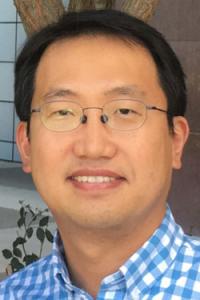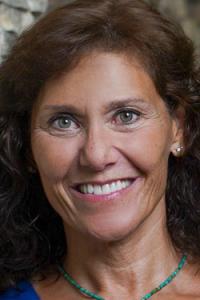IN THIS COLUMN
- Sun Il Kwon, College of Engineering
- Kimberly Elsbach, Graduate School of Management
- Emily Meineke, College of Agricultural and Environmental Sciences
- Olive Center, College of Agricultural and Environmental Sciences

Sun Il Kwon, an associate professional researcher in the Department of Biomedical Engineering, recently received the Hiruma/Wagner Award from the Japanese Research Foundation for Opto-Science and Technology. The award celebrates early career researchers who provide outstanding presentations at the Peace Through Mind/Brain Science conference — an event that is invite-only.
Kwon works in the Cherry Lab, led by Distinguished Professor Simon Cherry, who said of his team member’s achievement: “It’s an honor just to be invited to speak at the conference, and then to receive the award on top of that is extra special.”
The Peace Through Mind/Brain Science conference began in 1988, premised on the idea that greater world peace might come through a deeper understanding of the human mind and brain chemistry. Since 1989, the biannual event has welcomed scientists from across the globe to give presentations on how photonics, or the study of light, might be applied to solving human problems.
Kwon presented his team’s study on a new imaging technique they dubbed direct positron emission imaging, or dPEI, in 2021. The theoretical technique has the potential to provide much higher quality scans of the human body with faster image production rates or lower radiation doses — or both simultaneously — than positron emission tomography, or PET, the current standard for clinical scanners.
The novel imaging technique may also change the shape of the scanning field. Due to its ability to offer a full image of three-dimensional models without the large space requirements and geometrical constraints of PET, dPEI creates the opportunity for much smaller and simpler scanner designs, such as those specialized for certain organs like the brain.
“These small scanners could be used in small clinics as it does not require a lot of space,” Kwon said. “This would allow the opportunity for more frequent routine scans for cancer or chronic diseases.”
•••

Kimberly Elsbach, professor emeritus, Graduate School of Management, has been named the 2023 Journal of Management Inquiry Scholar, an annual honor given by the Western Academy of Management and the Journal of Management Inquiry.
An internationally renowned expert in organizational behavior, Elsbach has previously been recognized as a fellow of the Academy of Management — one of the highest honors bestowed upon a scholar in the management discipline — and UC Davis MBA students have selected her as their favorite professor multiple times.
The JMI Scholar award recognizes Western Academy of Management members who have distinguished themselves over the course of their careers, have a reputation for mentoring successful researchers and have personal qualities that enhance the academy’s culture.
Elsbach accepted the award at the academy’s annual meeting in Reno in March. There she participated in a fireside chat about her academic career success with Professor Antoaneta Petkova of San Francisco State University, president of the academy.
Read more in a blog post by Dean H. Rao Unnava on the GSM website.

Urban landscape entomologist Emily Meineke has been selected an Early Career Fellow of the Ecological Society of America, or ESA.
Meineke, an assistant professor who joined the Department of Entomology and Nematology in 2020, is one of 10 faculty members to receive the honor. She will be recognized at the society’s Aug. 6-11 meeting in Portland, Ore., and will retain the title for five years.
"This is one of the most prestigious awards an ecologist can receive," said nominator Rachel Vannette, community ecologist and associate professor, Department of Entomology and Nematology.
Vannette said Meineke’s laboratory "leverages natural history collections, citywide experiments and observations to characterize effects of recent anthropogenic change on plant–insect herbivore interactions.”
Meineke is the recipient of a National Science Foundation's Faculty Early Career Development (NSF-CAREER) Program; and the UC Davis Hellman Fellows Program.
Early Career Fellows are members within eight years of completing their doctoral training (or other terminal degree) who have advanced ecological knowledge and applications and show promise of continuing to make outstanding contributions to a wide range of fields served by ESA.

Two special-edition UC Davis olive oils, Premium Reserve and Koroneiki, produced by students at the Olive Center, earned gold medals in the California State Fair’s 2023 Commercial Extra Virgin Olive Oil Competition, conducted in March. The competition is open to extra virgin and flavored oils made completely from olives that are grown, pressed and packaged in California.
The UC Davis Premium Reserve topped its gold medal with two other awards:
- Best blend in California in the “robust” category of olive oils (which generally fall into one of three flavor characteristics: “robust,” “medium” or “delicate”).
- Best oil made from “any other cultivar,” that is, not made primarily from Mission, Manzanillo, Sevillano, Ascolano, Arbequina, Arbosana, Koroneiki or Frantoio. UC Davis’ Premium Reserve is made from a 50-50 mix of Mission and Picual olives from UC Davis’ Wolfskill Experimental Orchard.
“The robustness of the oil comes from the Mission variety, but also Picual,” said Javier Fernandez-Salvador, executive director of the Olive Center, part of the Robert Mondavi Institute for Wine and Food Science. Harvest of both batches took place Oct. 21, which is considered early.
The Premium Reserve (250-milliliter, or 8.45 ounces) features “clear aromas of fresh cut grass and hints of green tomato and green stone fruit,” he said. “Spicy and bitter, it’s great for pairing with strong cheeses and sweet food.”
Fernandez-Salvador said students are very involved in the center’s day-to-day operations, including orchard management and the design of oils like the special-edition Koroneiki, and every step of production: harvesting, milling, pressing and bottling. He and Adele Amico Roxas, the Olive Center’s associate program director, provide guidance.
According to the Olive Center, oil from Koroneiki olives, picked while still green, is highly prized for its aromatic, strong flavor, and is perfect in its natural state or added at the end of cooking. It has a complex aroma, often with subtle hints of herbs and vegetation growing in or near the groves.
Fernandez-Salvador said the center’s special-edition Koroneiki (250-milliliter, or 8.45 ounces) has a medium flavor characteristic. The label says the Koroneiki “contains fruit and floral notes that make it perfect for finishing any dish!”
Dateline UC Davis welcomes news of faculty and staff awards, for publication in Laurels. Send information to dateline@ucdavis.edu.
Media Resources
Dateline Staff: Dave Jones, editor, 530-752-6556, dateline@ucdavis.edu; Cody Kitaura, News and Media Relations specialist, 530-752-1932, kitaura@ucdavis.edu.